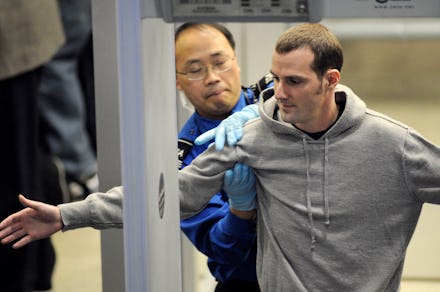The Simplest Solution for Speeding Up Airport Lines Is Right Under the TSA's Nose

Why not just end the TSA altogether? The government agency has not only become a symbol of the post-9/11 police state but has become inefficient at achieving even its most basic objectives. Long, slow lines are just the least of the the Transportation Security Administration's worries: Since 2001, TSA agents have been intrusively searching travelers' items, violating their bodies and confiscating personal items — all while remaining utterly ineffective at detecting guns, explosives or threatening suspects.
And now, to further facilitate that degrading and broken process, the TSA announced this week that it is offering a reward of up to $15,000 for the best ideas on how to speed up checkpoint queues. Rather than eradicating a proven useless system, they're trying to keep that broken system going with a few minor adjustments. While wait times may eventually decrease, no internal improvements will be made to the organization that wastes billions of dollars a year and has little to show for it. The TSA has become bloated — and this PR ploy is not going to repair it.
Instead of offering $15,000 in a faux effort to make the system better — throwing money at a problem that will never really be fixed — let's completely overhaul the TSA or just end the program all together.
How bad is the TSA? Really bad. Failed policies, ineffective screening for threats, inappropriate behavior by agents, a lack of skilled workers and a waste of money all beleaguer the TSA's programs.
In 2013, the Government Accountability Office (GOA) found that the TSA program that screens travelers by observation techniques costs nearly $1 billion annually and "is no better than chance," at identifying suspicious people, the Associated Press reported. Agents fail to find guns or knives less than 30% of the time, and, between 2010 and 2012, TSA employee misconduct grew by 26%.
Given the fact that, outside of the 9/11 attack, the number of terror attacks since 1970 have fallen exponentially, the TSA's program appears even more inadequate. Especially, because the TSA, equipped with 56,000 people at 450 American airports, has never "foiled a single terrorist plot or caught a single terrorist," according to security technologist Bruce Schneier.
The takeaway: The TSA's crowdsourced challenge to combat long airport security lines will ease a frustrating screening process that lengthens traveling time. The idea behind it "is about leveraging innovation and out-of-the-box thinking to find solutions to TSA's most challenging issues," TSA spokesman Ross Feinstein said.
However, if the TSA believes that lengthy queues are their biggest concerns, then they are glossing over what is at stake for people flying the friendly skies. Passengers face groping, mishandling and invasive searches that are not only unwarranted but are fruitless. So either total reform or shutting down the program would be superior alternatives because the system is broken and this is not the way to fix it.